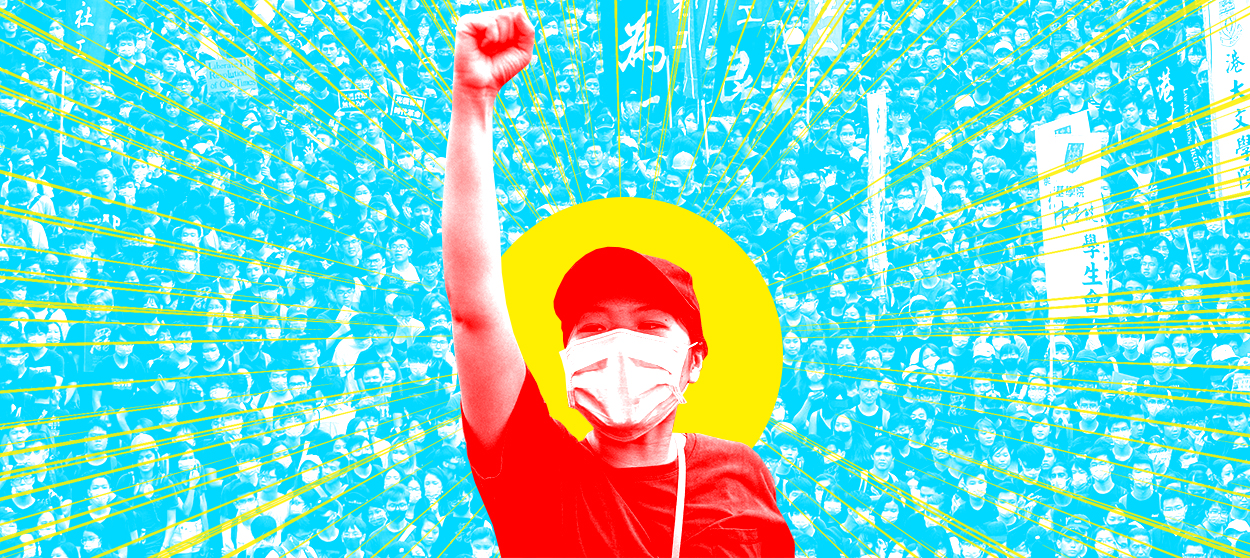The hope and futility of the Hong Kong protest movement
Is this what democracy looks like?


A free daily email with the biggest news stories of the day – and the best features from TheWeek.com
You are now subscribed
Your newsletter sign-up was successful
I nearly always agree with Bernard Shaw, that fountain of sanity, who once wrote: "If you don't begin to be a revolutionist at the age of 20 then at 50 you will be an impossible old fossil." Even the most hardened of old fossils could not fail to be moved by the recent images of protests in Hong Kong. This is especially true of the ones that took place in the rain: Hundreds of thousands of umbrellas in pale blue and pink and green, like an ocean made up of little cups of sorbet in every flavor. To quote a chant every drum-circle veteran will know: "This is what democracy looks like."
Or is it? No matter how much my heart goes out to people who would rather not live under the tyranny of the Chinese Communist Party, I have to admit that I see very little chance of anything changing for the better in Hong Kong. The formal withdrawal of the mainland extradition bill that was ostensibly the impetus for the last few months of demonstrations will not alter the horrifying reality that Beijing already "disappears" citizens of Hong Kong whenever it wishes with impunity. The official inquiries into the behavior of the police that protesters are asking for will never take place. These and other meta-demands will only lead to more violence. Nor will any amount of protest bring control of Hong Kong's elections to ordinary citizens — the creation of assemblies stuffed by pro-mainland stooges was a condition of the present "one country, two systems" constitution according to which Hong Kong and Macau are supposedly governed.
Carrie Lam, the region's chief executive, says it is time to "replace conflicts with conversations." If this sounds like the tagline to a new series of TED Talks sponsored by Goldman Sachs, that's because it more or less is. Protests are bad for business; human dignity is bad for the economy. President Trump's trade war and the looming possibility of a recession are bad enough. Let's all just move on, shall we?
The Week
Escape your echo chamber. Get the facts behind the news, plus analysis from multiple perspectives.

Sign up for The Week's Free Newsletters
From our morning news briefing to a weekly Good News Newsletter, get the best of The Week delivered directly to your inbox.
From our morning news briefing to a weekly Good News Newsletter, get the best of The Week delivered directly to your inbox.
This is exactly what the mainland authorities are already doing. Official Chinese media is preventing the bill's withdrawal from being discussed ahead of the 70th anniversary of the founding of the People's Republic on October 1. The Hong Kong government's retreat was humiliating, but the legislation itself was a legal formality anyway — no new authority was actually being granted, so none has been conceded. The whole thing might as well be forgotten.
Will the same moving on happen in Hong Kong? Protesters say no. I wish I could believe them. A few weeks of flag waving and student boycotts and dodging rubber bullets is one thing; the terrible reality of 12,000 sinister-looking riot police drilling in black armor and helmets across the border is another. While the scale of the recent protests was historic, the fundamental questions concerning the relationship between the region and the country to which it belongs are old ones. The answer to them is always the same: Remember your privileges and how quickly they might disappear.
I for one do not want to be cynical about the Hongkongers. Their demands are quixotic and their interest in securing rights for themselves that they know will always be denied to residents of mainland China strikes me as callous, but the authority under which they are chafing is, in fact, evil. For decades now, Beijing has put paid to the assumption of liberal meliorists that capitalism was the same thing as freedom. Their fellow Chinese enjoy the latter without the former and have confidence in their government.
This is not the case in Hong Kong. I welcome the disruption, however fleeting and symbolic, of all the forces against which her people are arrayed.
A free daily email with the biggest news stories of the day – and the best features from TheWeek.com
Matthew Walther is a national correspondent at The Week. His work has also appeared in First Things, The Spectator of London, The Catholic Herald, National Review, and other publications. He is currently writing a biography of the Rev. Montague Summers. He is also a Robert Novak Journalism Fellow.
